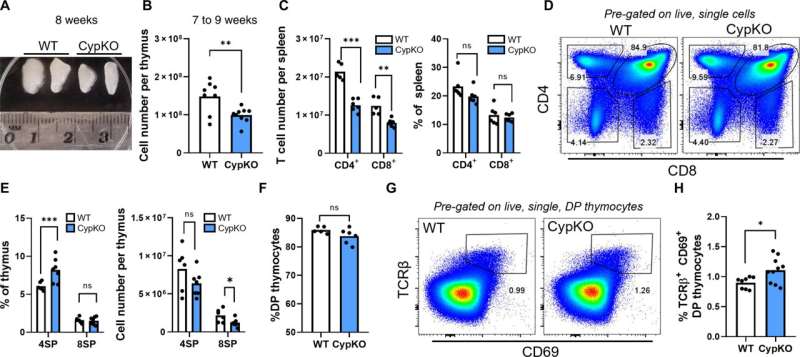How vitamin D deficiency can lead to autoimmune diseases

Reduced thymic cells and T cell development in CypKO mice. Credit: Advances in Science (2024). DOI: 10.1126/sciadv.adm9582
As Canadians prepare for “vitamin D winter”—the months when the sun is too low to produce the vitamin in the skin—a McGill University study explains why vitamin D deficiency is at a young age is associated with a high risk of autoimmune diseases.
During childhood, the thymus helps train the immune system to distinguish between the body’s own cells and the harmful invaders. A lack of vitamin D during that period of life causes the thymus to age more quickly, the researchers found.
The study was published in the journal Advances in Science.
“Aging of the thymus leads to impaired immune function,” said lead author John White, Professor and Chair of McGill’s Department of Physiology. “This means that the thymus becomes ineffective at filtering out immune cells that can mistakenly attack healthy cells, increasing the risk of autoimmune diseases such as type 1 diabetes. “
He noted that researchers have long known that vitamin D helps the body absorb calcium for strong bones, and that recent research has discovered its important role in regulating the immune system.
“Our findings bring new clarity to this connection and may lead to new strategies to prevent autoimmune diseases,” he said.
Although the research was done in mice, the findings are relevant to human health because the thymus works in the same way in both species, White added.
The importance of sunlight
Studies highlight the importance of getting enough vitamin D, especially in children.
“In places like Montreal, where we stop making vitamins from the sun between the fall and early spring, supplementation is important,” said White. “If you have a young child, it’s important to talk to your health care provider to make sure they’re getting enough.”
This success is based on a 2001 Finnish study, which followed more than 10,000 children. It found that children who were supplemented at an early age with vitamin D had a five times lower risk of developing type 1 diabetes later in life.
Finland, which has a long winter period of vitamin D, served as an ideal study to learn more about many aspects of the nutrient, White said.
In the McGill study, researchers used mice unable to produce vitamin D to assess how the deficiency affected the thymus, using tissue analysis and gene sequencing to see how it affected the immune system.
In future studies, White hopes to examine how vitamin D affects the human thymus, something he notes has never been done before.
Additional information:
Patricio Artusa et al, Impaired epithelial cell division and premature aging of the thymus in the absence of vitamin D signaling, Advances in Science (2024). DOI: 10.1126/sciadv.adm9582
Provided by McGill University
Excerpt: How vitamin D deficiency can lead to autoimmune diseases (2024, October 21) Retrieved 21 October 2024 from https://medicalxpress.com/news/2024-10-vitamin-d-deficiency-autoimmune-diseases. html
This document is subject to copyright. Except for any legitimate activity for the purpose of private study or research, no part may be reproduced without written permission. Content is provided for informational purposes only.
#vitamin #deficiency #lead #autoimmune #diseases